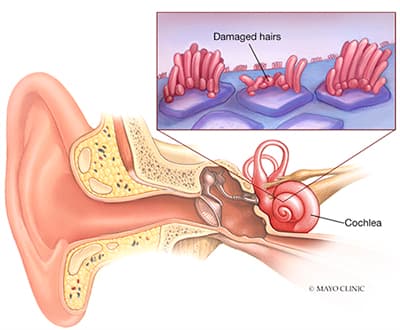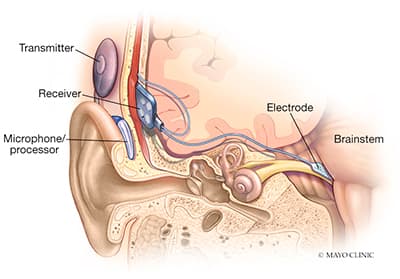
Otolaryngology (ENT)
Hearing Loss
 Hearing loss that occurs gradually as you age is common. Almost half of the people in the United States older than 65 have some degree of hearing loss. Aging and chronic exposure to loud noises contribute to hearing loss. Other factors, such as excessive earwax, can temporarily reduce how well your ears conduct sounds.
Hearing loss that occurs gradually as you age is common. Almost half of the people in the United States older than 65 have some degree of hearing loss. Aging and chronic exposure to loud noises contribute to hearing loss. Other factors, such as excessive earwax, can temporarily reduce how well your ears conduct sounds.
You can't reverse most types of hearing loss. However, you and our ear specialists can take steps to improve what you hear.
Signs and symptoms
Signs and symptoms of hearing loss may include:
- Avoidance of some social settings
- Difficulty understanding words, especially against background noise or in a crowd
- Frequently asking others to speak more slowly, clearly, and loudly
- Muffling of speech and other sounds
- Needing to turn up the volume of the television or radio
- Trouble hearing consonants
- Withdrawal from conversations
Causes
Causes of hearing loss include:
- Damage to the inner ear. Aging and exposure to loud noise may cause wear and tear on the hairs or nerve cells in the part of the ear that sends sound signals to the brain. When these hairs or nerve cells are damaged or missing, electrical signals aren't transmitted as efficiently, and hearing loss occurs.
- Ear infection and abnormal bone growths or tumors. In the outer or middle ear, any of these can cause hearing loss. Higher pitched tones may become muffled to you. It may become difficult for you to pick out words against background noise.
- Gradual buildup of earwax. Earwax can block the ear canal and prevent conduction of sound waves. Earwax removal can help restore your hearing.
- Ruptured eardrum (tympanic membrane perforation). Loud blasts of noise, sudden changes in pressure, poking your eardrum with an object and infection can cause your eardrum to rupture and affect your hearing.
Prevention
The following steps can help you prevent noise-induced hearing loss and avoid worsening of age-related hearing loss:
- Avoid recreational risks. Activities such as riding a snowmobile, hunting, using power tools or listening to rock concerts can damage your hearing over time. Wearing hearing protectors or taking breaks from the noise can protect your ears. Turning down the music volume is helpful too.
- Have your hearing tested. Consider regular hearing tests if you work in a noisy environment. If you've lost some hearing, you can take steps to prevent further loss.
- Protect your ears. Limiting the duration and intensity of your exposure to noise is the best protection. In the workplace, plastic earplugs or glycerin-filled earmuffs can help protect your ears from damaging noise.
Treatment
If you have hearing problems, help is available. Treatment depends on the cause and severity of your hearing loss. Options include:
- Cochlear implants. If you have more severe hearing loss and gain limited benefit from conventional hearing aids, then a cochlear implant may be an option. Unlike a hearing aid that amplifies sound and directs it into your ear canal, a cochlear implant bypasses damaged or nonworking parts of your inner ear and directly stimulates the hearing nerve. Our ENT providers partner with audiologists to help you understand the risks and benefits to all your treatment options.
- Hearing aids. If your hearing loss is due to damage to your inner ear, a hearing aid can be helpful. An audiologist can discuss with you the potential benefits of a hearing aid and fit you with a device.
- Removing wax blockage. Earwax blockage is a reversible cause of hearing loss. Your doctor may remove earwax using suction or a small tool with a loop on the end.
- Surgical procedures. Some types of hearing loss can be treated with surgery, including abnormalities of the eardrum or bones of hearing. If you've had repeated infections with persistent fluid, your doctor may insert small tubes that help your ears drain.
